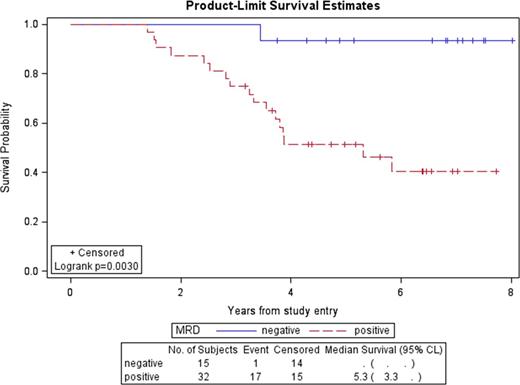Abstract
Introduction: Aggressive chemo-immunotherapy followed by peripheral blood stem cell autografting (ASCT) in CALGB 59909 achieved a median progression-free survival (PFS) in MCL of 5 years (Damon et al JCO, 2009), but late recurrences occurred. Bortezomib has a 33% response rate in relapsed/refractory MCL. Using the CALGB 59909 treatment backbone, we evaluated tolerability and efÞcacy of adding post-transplant BC or BM in a randomized phase II trial.
Methods: The primary endpoint was PFS estimated from study entry for each treatment arm. Induction therapy was with 2-3 cycles of augmented R-CHOP (2000 mg/m2 cyclophosphamide) and methotrexate (300 mg/m2) followed by high-dose cytarabine/etoposide/rituximab(R)/Þlgrastim (EAR) stem cell mobilization and cyclophosphamide/carmustine/etoposide (CBV) ASCT. After 2 doses of post-transplant R, patients were randomized to BC (1.3 mg/ m2 days 1, 4, 8, 11 of a 3 week cycle for 4 cycles) or BM (1.6 mg/m2 weekly 4 of 8 weeks for 18 months) beginning at approximately day 90. Minimal residual disease (MRD) was analyzed using patient-specific PCR probes for the bcl-1 / IgH junction or the IgH CDR3 region.
Results: 151 patients were enrolled at 14 sites and 147 received treatment. Median age was 59 (29-69); stage II (2.7%), III (12%), IV (86%); MIPI low (52.4%), int. (30.6%), high (17%); blastoid histology (14%); bone marrow involvement (81%). 118 (88%) underwent ASCT and 102 (68%) were randomized. Most withdrawals (45) were for progression (10) or adverse events (AEs) (19) including 4 treatment-related deaths. Following randomization, 34 (65%) completed BM and 33 (66%) completed BC. Withdrawal for AEs occurred in 14 (28%) of BC and 7 (13%) of BM patients (p = 0.088), most for cytopenias or peripheral neuropathy. Median follow-up was 5.5 years from registration. Median PFS was significantly greater than the null hypothesis (4 years) for both BM and BC (1-sided test of exponential parameter p < 0.001). The 5-year PFS estimates from study entry in the BM and BC arms were 70% (55-81%) and 69% (54-80%), respectively. Progression occurred in 17 BM (12 post-treatment) and 19 BC patients (all post-treatment). Five-year PFS from time of transplantation in CALGB studies 50403 (n=118) and 59909 (n=66) was 72.7% (63-80%) and 51.5% (36.7-62%), respectively (log rank p=0 0006) favoring the 50403 trial which differed from 59909 only by the addition of post-transplant bortezomib. MRD results were available in 47 patients. Five-year PFS from study entry was 93% if MRD-negative (n=15) and 51% if MRD-positive (n=32) following induction chemo-immunotherapy (log rank p=.003) (See figure).
Conclusions: Induction chemotherapy followed by ASCT and either BC or BM was efficacious and tolerable, although BC was associated with more withdrawals for toxicity. The comparison between studies 50403 and 59909 suggests a PFS benefit from the addition of BC or BM. MRD-negativity following induction chemo-immunotherapy is highly associated with improved PFS and could provide an important tool for designing future trials.
Off Label Use: Post-autotransplant use of bortezomib . Bartlett:Seattle Genetics: Consultancy, Research Funding; Gilead: Consultancy; Janssen: Research Funding; Pharmacyclics: Research Funding; Astra Zeneca: Research Funding; ImaginAB: Research Funding; Genentech: Research Funding; Pfizer: Research Funding; Novartis: Research Funding; Medimmune: Research Funding; Millenium: Research Funding; Celgene: Research Funding. Byrd:Acerta Pharma BV: Research Funding. Blum:cephalon: Research Funding; Janssen: Research Funding; Celgene: Research Funding; Pharmacyclics: Research Funding. Hurd:Procter and Gamble: Equity Ownership; Medtronic: Equity Ownership; Pfizer: Equity Ownership; Merck: Equity Ownership; Bristol Myers Squib: Equity Ownership. Czuczman:MorphoSys: Consultancy; Cellgene: Employment; Immunogen: Membership on an entity's Board of Directors or advisory committees; Boehringer-Ingelheim: Membership on an entity's Board of Directors or advisory committees. Leonard:Weill Cornell Medical College: Employment; Genentech: Consultancy; Medimmune: Consultancy; AstraZeneca: Consultancy; Spectrum: Consultancy; Boehringer Ingelheim: Consultancy; Vertex: Consultancy; ProNAI: Consultancy; Biotest: Consultancy; Seattle Genetics: Consultancy; Pfizer: Consultancy; Mirati Therapeutics: Consultancy; Gilead: Consultancy; Novartis: Consultancy. Cheson:AstraZeneca: Consultancy; Astellas: Consultancy; Ascenta: Research Funding; Spectrum: Consultancy; Teva: Research Funding; MedImmune: Research Funding; Pharmacyclics: Consultancy, Research Funding; Gilead: Consultancy, Research Funding; Roche/Genentech: Consultancy, Research Funding; Celgene: Consultancy, Research Funding.
Author notes
Asterisk with author names denotes non-ASH members.


This feature is available to Subscribers Only
Sign In or Create an Account Close Modal